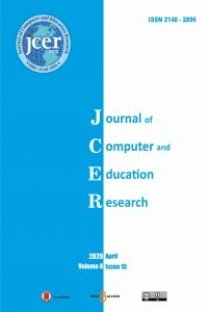Educational Technology Research Trends in Turkey: Investigating Graduate Theses in English Language Teaching
Educational technology, English language teaching, thematic content analysis
Educational Technology Research Trends in Turkey: Investigating Graduate Theses in English Language Teaching
___
- Arıkan, A., & Yılmaz, A. F. (2020). Pre-service english language teachers’ problematic sounds. International e-Journal of Educational Studies (IEJES), 4 (7), 1-26.
- Aydınlı, J., & Ortaçtepe, D. (2018). Selected research in applied linguistics and English language teaching in Turkey: 2010-2016. Language Teaching, 51(2), 210-245.
- Cesur, K., Muhammed, K. Ö. K., & Aydın, Ç. (2018). Content analysis of abstracts on ELT research available in Turkish journalpark academic platform. ELT Research Journal, 7(2), 58-77.
- Chen, Z., Chen, W., Jia, J., & An, H. (2020). The effects of using mobile devices on language learning: a meta-analysis. Educational Technology Research and Development, 68(4), 1769-1789.
- Dirlikli, M., Aydın, K., & Akgün, L. (2016). Cooperative learning in Turkey: A content analysis of theses. Educational Sciences: Theory & Practice, 16(4), 1251-1273.
- Durak, G., Çankaya, S., Yünkül, E., Urfa, M., Topraklıklıoğlu, K., Arda, Y., & İnam, N. (2017). Trends in distance education: A content analysis of master's thesis. TOJET: The Turkish Online Journal of Educational Technology, 16(1), 203-218.
- Durak, G., Çankaya, S., Yunkul, E., & Mısırlı, Z. A. (2018). A content analysis of dissertations in the field of educational technology: The case of Turkey. Turkish Online Journal of Distance Education, 19(2), 128-148.
- Gökmen, Ö. F., Uysal, M., Yasar, H., Kirksekiz, A., Güvendi, G. M., & Horzum, M. B. (2017). Methodological trends of the distance education theses published in Turkey from 2005 to 2014: A content analysis. Education and Science, 42(189), 1-25.
- Göktaş, Y., Kucuk, S., Aydemir, M., Telli, E., Arpacik, O., Yildirim, G., & Reisoglu, I. (2012). Educational technology research trends in Turkey: A content analysis of the 2000-2009 decade. Educational Sciences: Theory and Practice, 12(1), 191-199.
- Güler, H., & Taş, E. (2020). Thematic content analysis for pre-school science education research areas in Turkey. Journal of Computer and Education Research, 8(15), 323-343.
- Inal, D., Özdemir, E., Kiray, G., & Oral, Y. (2016). Review of doctoral research in English language teaching and learning in Turkey (2009-2013). Language Teaching, 49(3), 390-410.
- Kessler, G. (2018). Technology and the future of language teaching. Foreign Language Annals, 51(1), 205-218.
- Kırmızı, O. (2012). Research trends in MA ELT programs in Turkey. Procedia-Social and Behavioral Sciences, 46, 4687-4691.
- Koçyiğit, M., & Erdem, C. (2018). A content analysis of graduate research on English preparatory programs at universities. Journal of Human Sciences, 15(3), 1466-1480.
- Küçük, S., Aydemir, M., Yildirim, G., Arpacik, O., & Goktas, Y. (2013). Educational technology research trends in Turkey from 1990 to 2011. Computers & Education, 68, 42-50.
- Özmen, K. S., Cephe, P. T., & Kinik, B. (2016). Trends in doctoral research on English language teaching in Turkey. Educational Sciences: Theory and Practice, 16(5), 1737-1759.
- Parmaxi, A., & Zaphiris, P. (2016). Web 2.0 in Computer-Assisted Language Learning: a research synthesis and implications for instructional design and educational practice. Interactive Learning Environments, 25(6), 704-716.
- Shadiev, R., Hwang, W. Y., & Huang, Y. M. (2017). Review of research on mobile language learning in authentic environments. Computer Assisted Language Learning, 30(3-4), 284-303.
- Solak, E. (2014). The Content analysis of the research papers on foreign language education in Turkey. International Journal of English and Education, 3(3), 167-178.
- Strelan, P., Osborn, A., & Palmer, E. (2020). The flipped classroom: A meta-analysis of effects on student performance across disciplines and education levels. Educational Research Review, 30 100314.
- Şimşek, M. R., & Dündar, E. (2017). Investigating EFL coursebook research in Turkey: Trends in graduate theses of the 2001-2013 period. Educational Sciences: Theory & Practice, 17(3), 969-1014.
- Şişman, E. P., Büyükkarcı, K., & Özyurt, E. (2019). Research in ELT: Turkish Context. In Proceedings of the 3rd International Congress on Research in Education, 91-100.
- Uzunboylu, H., & Kocakoyun, S. (2016). A content analysis of master and doctorate thesis in the area of gamification. International Journal of Innovative Research In Education, 3(3), 143-154.
- Yağız, O., Aydın, B., & Akdemir, A. S. (2016). ELT research in Turkey: A content analysis of selected features of published articles. Journal of Language and Linguistic Studies, 12(2), 117-134.
- Yıldırım, A., & Şimşek, H. (2013). Sosyal bilimlerde nitel araştırma yöntemleri (Qualitative research methods in social sciences) (9th ed.). Ankara: Seçkin Yayınevi.
- Yıldız, E. P., Cengel, M., & Alkan, A. (2020). Current trends in education technologies research worldwide: Meta-analysis of studies between 2015-2020. World Journal on Educational Technology: Current Issues, 12(3), 192-206.
- Yayın Aralığı: 2
- Başlangıç: 2013
- Yayıncı: Tamer KUTLUCA
Online Education Skills of Teachers: Four Axes of Gaps
Lise Öğrencilerinin Çevrimiçi Oyun Tercihleri ile Çevrimiçi Oyun Oynama Bozuklarının İncelenmesi
Hakkı BAĞCI, Ebru ALBAYRAK ÖZER
Mıknatıs Konusunun Öğretimine Yönelik Geliştirilen Eğitsel Bir Oyun Hakkında Öğretmen Görüşleri
Aslıhan ERTUĞRUL, Orhan KARAMUSTAFAOĞLU
Okul Öncesi Öğretmenlerinin Sınıf Yönetimine Dair Görüşleri
Gizem Sebahat ÇOBAN, Mehmet Necati CİZRELİOĞULLARI
Ortaokul Öğrencilerinin Matematik Öz Yeterlik Düzeylerinin İncelenmesi
